-
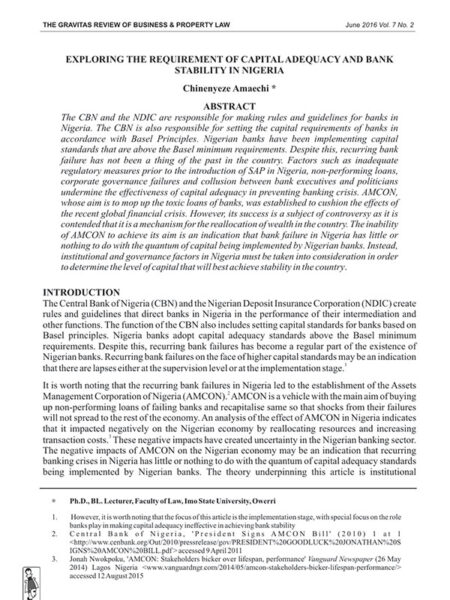
Exploring the Requirement of Capital Adequacy and Bank Stability in Nigeria
0₦2,500.00Dr Chinenyeze Amaechi of the Faculty of Law, Imo State University, Owerri in his article “Exploring the Requirement of Capital Adequacy and Banking Stability in Nigeria” explores the world of bank failures beyond capital adequacy. He argues that in spite of the fact that Nigerian banks have been implementing capital standards that are above the Basel minimum requirements, bank failures are still threateningly close due to inadequate regulatory measures, high rate of non-performing loans and corporate governance failures. He contends that the macroprudential and stabilising impact of the Asset Management Corporation of Nigeria, AMCON, in mopping up banks’ toxic loans has been blighted by controversies surrounding transparency issues and in leaving rescued banks without working capital.
-
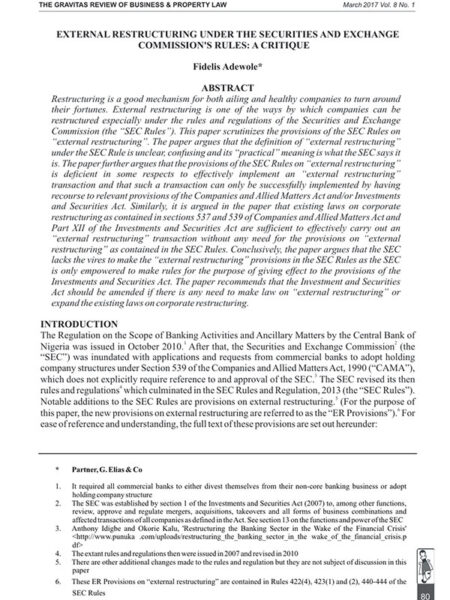
External Restructuring under the Securities and Exchange Commission’s Rules: A Critique
0₦2,500.00Fidelis Adewole, Partner, Elias & Co in “External Restructuring under the Securities and Exchange Commission’s Rules: A Critique” scrutinises the provisions of the SEC Rules on “external restructuring” (ER) and argues that the provisions are vague, confusing and inadequate for the effective implementation of ER transactions. He posits that the provisions of the Companies and Allied Matters Act and the Investments and Securities Act are adequate to cover ER transactions and therefore the ER Provisions by the SEC are unnecessary just as the SEC has no power to make the Rules in the first place.
-
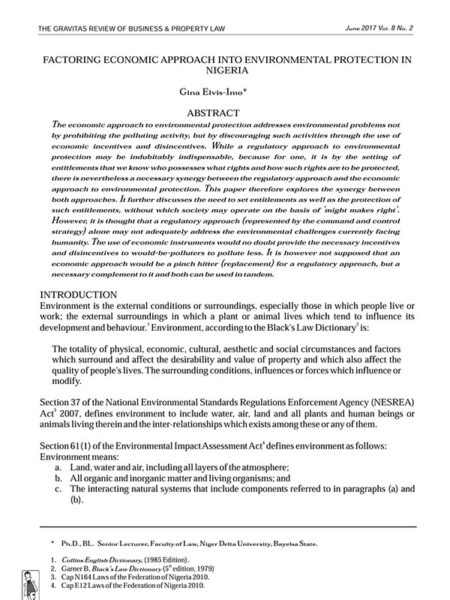
Factoring Economic Approach into Environmental Protection in Nigeria
0₦2,500.00Dr Gina Elvis-Imo, Senior Lecturer, Faculty of Law, Niger Delta University, Bayelsa State in her article “Factoring Economic Approach into Environmental Protection in Nigeria” examines various approaches, voluntary, regulatory and economic, to environmental protection. She argues that while a regulatory approach to environmental protection may be indubitably indispensable, the economic approach addresses environmental problems not by prohibiting the polluting activity, but by discouraging such activities through the use of economic incentives and disincentives. The paper explores the synergy between both approaches, and the need to set entitlements as well as the protection of such entitlements, without which society may operate on the basis of ‘might makes right’.
-
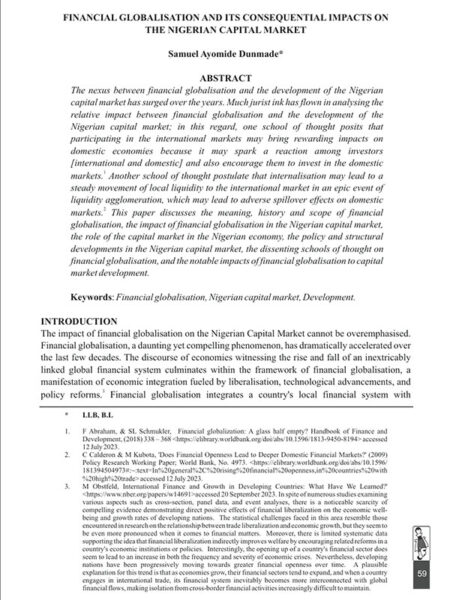
Financial Globalisation and its Consequential Impacts on the Nigerian Capital Market
0₦2,500.00Samuel Dunmade, in his article, Financial Globalisation and its Consequential Impacts on the Nigerian Capital Market, examines the concept of financial globalisation and its impact on the Nigerian capital market. The nexus between financial globalisation and the development of the Nigerian capital market has surged over the years. Much jurist ink has flown in analyzing the relative impact between financial globalisation and the development of the Nigerian capital market; in this regard, one school of thought posits that participating in the international markets may bring rewarding impacts on domestic economies, because it may spark a reaction among investors [international and domestic] and also encourage them to invest in the domestic markets. Another school of thought postulates that the internalization may lead to a steady movement of local liquidity to the international market in an epic event of liquidity agglomeration, which may lead to negative spill-over effects on domestic markets. Dunmade discusses the meaning, history and scope of financial globalization, the impact of financial globalisation in the Nigerian capital market, the role of capital market in the Nigerian economy, the policy and structural developments in the Nigerian capital market, the dissenting schools of thought on financial globalization, and the notable impacts of financial globalisation to capital market development.
-
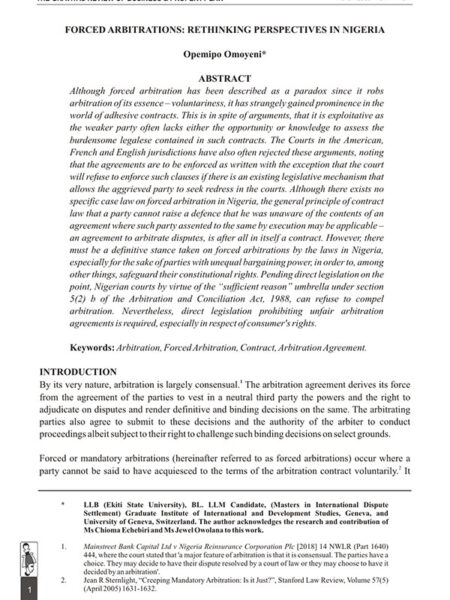
Forced Arbitrations: Rethinking Perspectives in Nigeria
0₦2,500.00Opemipo Omoyeni of the Graduate Institute of International and Development Studies Geneva Switzerland in his article, Forced Arbitrations: Rethinking Perspectives in Nigeria, considers the concept of Forced or Mandatory Arbitration which occurs mostly in standard form contracts where a party cannot be said to have acquiesced to the terms of the arbitration contract voluntarily. Omoyeni examines the state of the law in Nigeria, the United States of America, and the United Kingdom. Omoyeni posits that Forced Arbitration may work an injustice on the weaker party in an uneven bargaining position who is compelled to arbitrate his dispute while lacking the financial capacity or wherewithal to arbitrate, and who as well cannot be said to have given real consent to do so. He concludes with the need for legislation and the courts’ intervention to protect the weaker party.
-
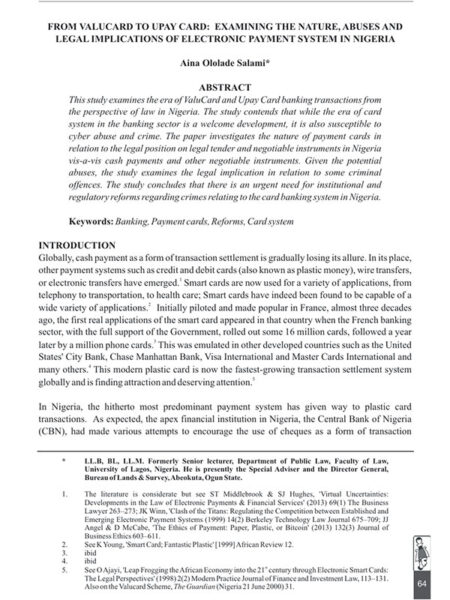
From Valucard to Upay Card: Examining the Nature, Abuses and Legal Implications of Payment Cards in Nigeria
0₦2,500.00Aina Salami, formerly Senior lecturer, Department of Public Law, University of Lagos and presently the Director-General, Bureau of Lands & Survey Ogun State, in his article, From Valucard to Upay Card: Examining the Nature, Abuses and Legal Implications of Payment Cards in Nigeria, examines the legal nature, types and abuses of payment cards in Nigeria. Given the potential abuses of card transactions, Salami explores some criminal offences relating to card transaction and advocates urgent institutional and regulatory reforms to accommodate global trends in payment systems.
-
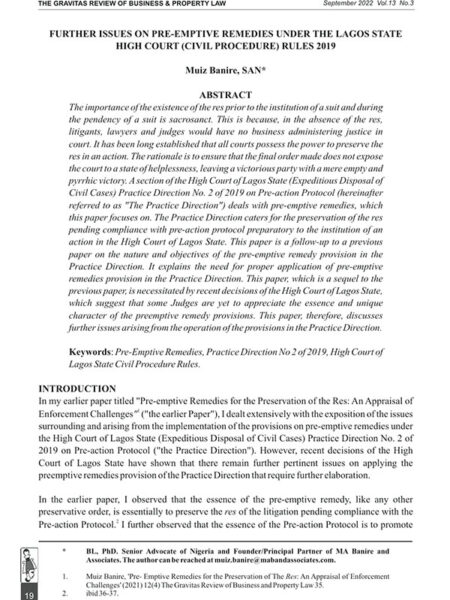
Further Issues on Pre-Emptive Remedies Under the Lagos State High Court (Civil Procedure) Rules 2019
0₦2,500.00Dr Muiz Banire SAN, Principal Partner of MA Banire and Associates, in his article, Further Issues on Pre-Emptive Remedies Under the Lagos State High Court (Civil Procedure) Rules 2019, notes the importance of the existence of the res prior to the institution of a suit and during its pendency. He explains that all courts possess the power to preserve the res in an action. The rationale is to ensure that the final order does not expose the court to a state of helplessness, leaving a victorious party with a mere empty and pyrrhic victory. A section of the High Court of Lagos State (Expeditious Disposal of Civil Cases) Practice Direction No. 2 of 2019 on Pre-action Protocol deals with pre-emptive remedies. Dr Banire, in the article, which is a sequel to the one published by The Gravitas Review in December 2021, explains the need for a proper application of preemptive remedies provision in the Practice Direction. He examines recent decisions of the High Court of Lagos State, which suggest that some Judges are yet to appreciate the essence and unique character of the preemptive remedy provisions.
-
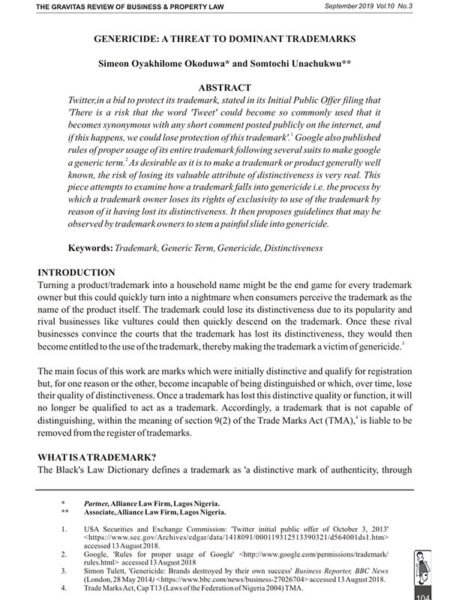
Genericide: A Threat to Dominant Trademarks
0₦2,500.00Simeon Okoduwa and Somtochi Unachukwu of Alliance Law Firm, Lagos Nigeria in their article, Genericide: A Threat to Dominant Trademarks, discuss the generification of trademarks as a result of the loss of distinctiveness. They suggest insightful guidelines that may be observed by trademark owners to stem a painful slide into genericide.
-
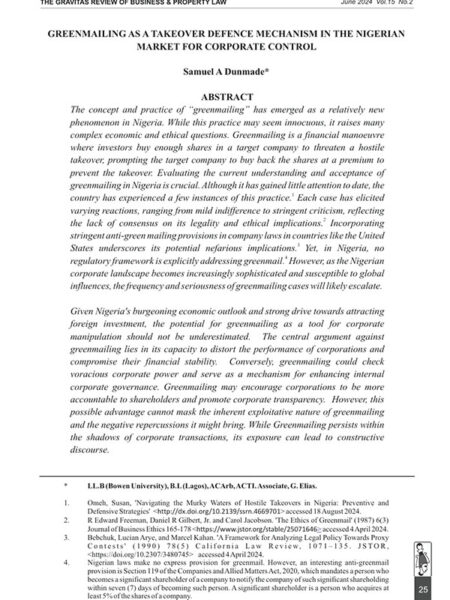
Greenmailing as a Takeover Defence Mechanism in the Nigerian Market for Corporate Control
0₦2,500.00Samuel A. Dunmade, in his article, Greenmailing as a Takeover Defence Mechanism in the Nigerian Market for Corporate Control, examines the concept and practice of “greenmailing” as a relatively new phenomenon in Nigeria. Put simply, greenmailing is a financial manoeuvre where investors buy enough shares in a target company to threaten a hostile takeover thereby prompting the target company to buy back the shares at a premium to prevent the takeover. Whilst this practice may seem innocuous on its surface, it raises a host of complex economic and ethical questions. It is crucial to evaluate the current understanding and acceptance of greenmailing in Nigeria. Although it has gained little attention to date, the country has experienced a few instances of this practice. Each case has elicited varying reactions, ranging from mild indifference to stringent criticism, a reflection of the lack of consensus on its legality and ethical implications. The incorporation of stringent anti-green mailing provisions in company laws in countries like the United States underscores its potential nefarious implications. Yet, in Nigeria, no regulatory framework is explicitly addressing greenmail. However, as the Nigerian corporate landscape becomes increasingly sophisticated and susceptible to global influences, the frequency and seriousness of greenmailing cases will likely escalate.
-
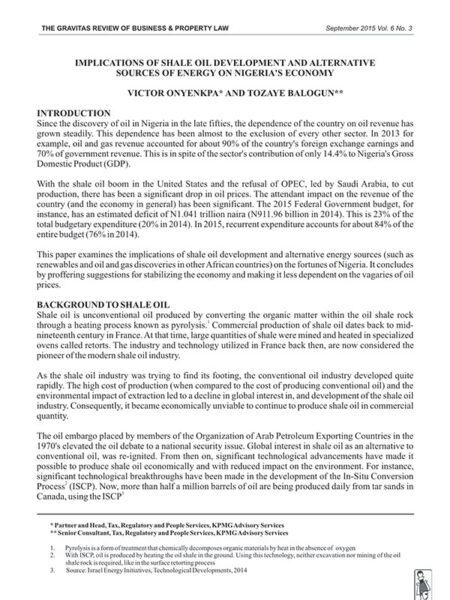
Implications of Shale Oil Development and Alternative Sources of Energy on Nigeria’s Economy
0₦2,500.00It is not just another scare: Victor Onyenkpa and Tozaye Balogun, Partner and Senior Consultant respectively, KPMG Advisory Services, with facts and figures, examine the dire consequences of the development of Shale Oil on Nigeria’s economy. Their article, “Implications of Shale Oil Development and Alternative Sources of Energy on Nigeria’s Economy” however proffers a way out.
-
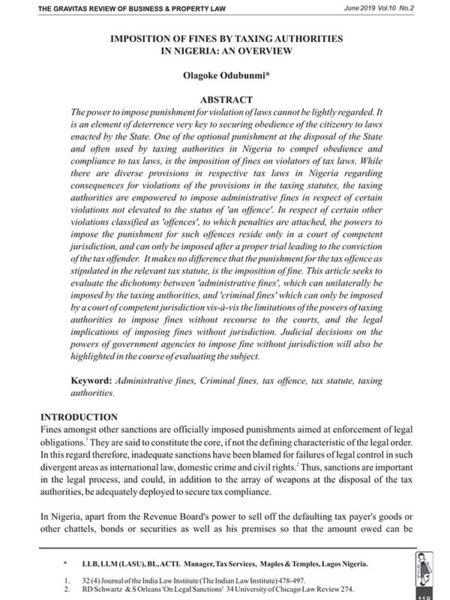
Imposition of Fines by Taxing Authorities in Nigeria: An Overview
0₦2,500.00Olagoke Odubunmi, Manager, Tax Services, Maples & Temples, Lagos Nigeria in his article, Imposition of Fines by Taxing Authorities in Nigeria: An Overview makes a distinction between ‘administrative fines’, which can unilaterally be imposed by a taxing authority, and ‘criminal fines’ which can only be imposed by a court of competent jurisdiction. He considers the legal implication of taxing authorities imposing fines without jurisdiction and concludes with a review of judicial authorities on the powers of government agencies in the imposition of ‘criminal fines’.
-
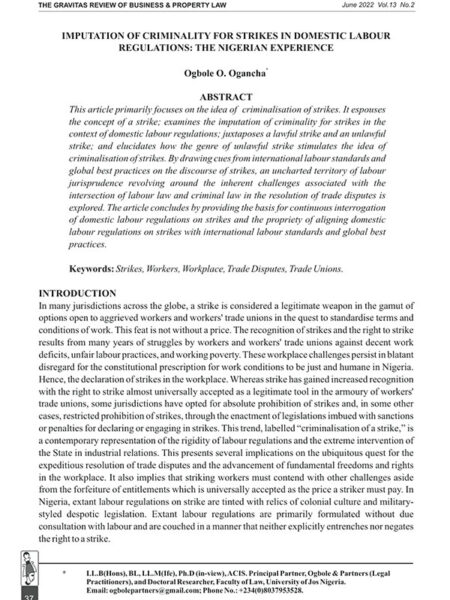
Imputation of Criminality for Strikes in Domestic Labour Regulations: The Nigerian Experience
0₦2,500.00Ogbole Ogancha of Ogbole & Partners, and Doctoral Researcher at the Faculty of Law, University of Jos Nigeria, in his article, Imputation of Criminality for Strikes in Domestic Labour Regulations: The Nigerian Experience, examines the imputation of criminality for strikes in the context of domestic labour regulations. He considers the concept of ‘lawful strikes’ and ‘unlawful strikes’ and argues that ‘unlawful strikes’ stimulate the idea of criminalisation of strikes. Ogancha explores Nigerian laws and regulations on the issue. Drawing cues from international labour standards and global best practices, he concludes that the criminalisation of strikes is not a sufficient or ideal deterrence. A progressive approach lies in the speedy identification of the causes of workers’ discontent.
The Gravitas Review of Business & Property Law



